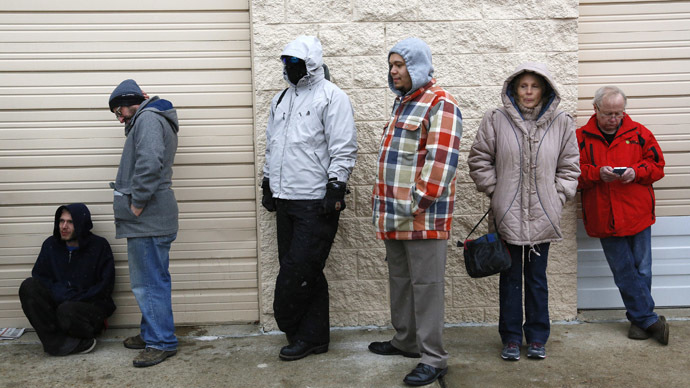Welfare cuts, benefit sanctions causing hunger, food insecurity – Oxford study

Harsh austerity measures including slashed welfare payments and dwindling public services have caused the rapid spread of food banks across Britain, new academic research suggests.
The research,“Austerity, sanctions, and the rise of food banks in the UK,” was published on Wednesday in the British Medical Journal. It was conducted by a team of academics from Oxford University.
The study’s authors analyzed data from the Trussell Trust, a leading NGO that coordinates food banks across the UK. They noted that increasing numbers of doctors in Britain are witnessing their patients turn to food banks to survive, and concluded that the UK government's argument that this trend is the result of supply rather than demand is false.
The government has long refused to admit to a link between its austerity policies and a dramatic explosion in food banks across the state. However, the Oxford University report shows otherwise.
READ MORE: ‘Britain’s inhumane welfare sanctions causing destitution & hunger’ – Church leaders
The study highlighted a concrete link between demand for food parcels and the government’s austerity measures. It found demand for emergency food aid is highest in areas where poverty occurs in tandem with reductions in social welfare payments. It also revealed that emergency food assistance is particularly common in regions where high levels of unemployment exist.
When the coalition government came to power in 2010, the Trussell Trust food banks were active in 29 local council areas throughout Britain. By 2013/14, however, this number had risen to 251. Over the same period, the Trussell Trust’s rate of emergency food aid distribution had tripled, the Oxford University study said.
While soup kitchens have long been present in the UK, the rapid spread of food banks is a recent phenomenon. This new trend has been sharply criticized by the UK’s Faculty of Public Health, which warned Prime Minister David Cameron in 2014 that Britain’s welfare system was “increasingly failing to provide a robust last line of defense against hunger.”
The Oxford University research, published Wednesday, uncovered stark fluctuations between different regions. While less than 0.1 percent of people based in Lichfield, Staffordshire, required emergency food parcels, this figure soared to 8 percent in Newcastle upon Tyne.
Some of these variations stemmed from the length of time a particular food bank had been established, the research found. Nevertheless, the report said higher levels of emergency food distribution were “significantly associated” with austerity policies and welfare cuts.
READ MORE: #PeopleNotPolls: Labour & Tories sugarcoating future austerity, says govt adviser
The report found high rates of food parcel use were particularly evident where benefits sanctions had been enforced on jobless claimants who had their payments terminated for at least a month as a result of not meeting local job center regulations.
The report’s authors called upon the government to introduce a strategic framework to tackle food insecurity in the UK, which includes “monitoring and addressing the root social and economic drivers of this problem.”
The driving force behind rising numbers of people turning to emergency food aid has been a matter of debate since the coalition government came to power. Conservative politicians suggest the trend is not symptomatic of growing food insecurity, but is a direct result of food charities broadening their operations. Those who espouse this view say more people are merely helping themselves to free food.
Food charities have dismissed this argument, however, warning that it ignores the grueling impact of austerity. They argue emergency food parcels are offered to UK residents who are plagued by financial hardship and food insecurity.
In late 2014, a joint report by the Trussell Trust, the Church of England, Oxfam and the Child Poverty Action Group revealed that those who use food banks are more likely to be single adults or single parents, live in rented accommodation, suffer unemployment and have borne the brunt of some sort of benefits sanction.
An official report by Britain’s Department for Environment, Food, and Rural Affairs also expressed concerns about the rise of food insecurity.
Against a backdrop of mounting criticism, a cross-party parliamentary probe into hunger and food poverty was conducted in 2014. The inquiry’s report, released in December, found that financial hardship, austerity and government-driven sanctions may explain the rising use of food banks. The study also found a greater degree of clarity is required on how food insecurity is defined in Britain, and a system that monitors such trends is paramount.
READ MORE: Half-blind UK widow commits suicide after incapacity benefit cut
James Meadway, a senior economist at UK think tank the New Economics Foundation (NEF), said the Oxford University study's implications are clear.
"The research, peer reviewed and published in one of the world's leading medical journals, should finally kill off the ridiculous claim that more people are using food banks because they want to, rather than because they have to," he told RT.
"The last official figures available, up to 2013, show the poorest 10% having a decline in their income of 15%, after inflation, in a single year. This has been driven overwhelmingly by benefits cuts."
"It's obvious that if the poorest people are squeezed like this, they'll be forced into relying on charity," he added.
Alex Zatman, a spokesperson for the Department of Work and Pensions, told RT on Thursday that the Oxford University study was not representative of the true picture on the ground.
He argued that the government spends £94 billion a year on working-age benefits and offers diverse advice and assistance for those in need of extra support.
“The vast majority of benefits are processed on time with improvements being made year on year and the number of sanctions has actually gone down,” Zatman said.
“There are now record numbers of people in work in the UK and a majority of the rise in employment has been in managerial and professional occupations,” he added.
READ MORE: Blind to austerity: Whitehall oblivious to corrosive impact of cuts, says watchdog
Reflecting on Zatman's claim regarding Britain's rise in employment, Meadway said a "sleight of hand" was apparent.
"Whilst professional and managerial occupations may have increased, there has been a clear decline in the quality of these jobs, as official statistics show average pay declining for these occupations."
"That mirrors a wider problem in which earnings have simply not kept up with price rises until very recently. Coupled with the record numbers on zero hour contracts and in part-time work, it is pretty clear that the economy is producing more and more worse and worse jobs."
British economist and anti-austerity campaigner Michael Burke said the study’s findings are “deeply disturbing.”
The research offers “conclusive proof of the negative effects of cuts to social security and the effects on the most vulnerable,” he said.
Burke rejected the government’s argument that Britain has seen a rise in the number of people claiming food parcels because they are more readily available. He said that food insecurity was increasing as a result of austerity cuts and the rise of low-paid work, which in turn has increased the number of working people plagued by poverty.
The economist and anti-austerity campaigner dismissed the DWP's suggestion that there are now record numbers of people in gainful employment as "meaningless."
“The population continues to grow and there needs to be higher new levels in employment just to keep pace,” he said.
Burke also questioned the DWP’s claim that much of Britain’s newly created jobs are in managerial and professional occupations.
“The government's boasts about the quality of new jobs are misplaced. The new jobs are skewed toward low productivity and low-skilled service sector jobs,” he said.












